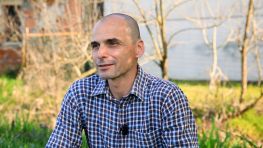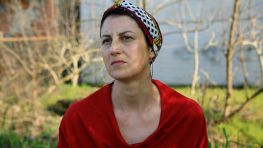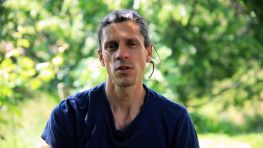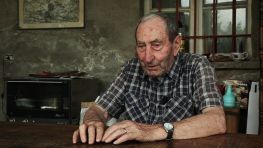 Roberto Marinone
Roberto Marinone Gabriele Varalda
The Vercelli Giant Rice Presidium.
Gabriele Varalda, born in 1956, after having founded the Slow Food Convivium of Vercelli has placed the theme of rice growing at the center of the associative debate, a crop that has been neglected as it is considered industrial and therefore distant from the products and supply chains normally followed by Slow Food.
Varalda was first an official in the Province of Vercelli, as head of the environment and agriculture sectors, and then moved to the Piedmont Region to direct the sector of agri-environmental measures. Gabriele focuses his story on the recovery of an abandoned variety of rice since the 1930s: the Riso Gigante Vercelli.
A truly interesting plant from an environmental point of view, due to its great resistance to brusone, one of the most serious diseases affecting rice and probably the one that requires the greatest number of phytotherapeutic treatments. In agreement with two local farmers, Pier Giorgio Varalda and Maurizio Tabacchi, he initiates a process of recovery of this original variety of rice, finally constituting the first Slow Food Presidium dedicated to the recovery of an ancient variety of rice.
Video table of contents
- The Slow Food Convivium of Vercelli and the professional path.
- Taking care of rice for Slow Food and the paddy field.
- Ecological networks and the need to recreate naturalness in the paddy field.
- The conquest of the eight hours, the mondine, the great changes of the 60s with chemistry and mechanization.
- Rice was one of the crops. With the green revolution, large farmhouses are no longer needed and there is a land merger. We are on a 400-hectare farm.
- Riso Gigante Vercelli and the idea of setting up a Presidium.
- Gigante Vercelli and resistance to brusone.
- The devastation in the field from the brusone in 2009, the monitoring with the captaspores, and the bulletin.
- Il Gigante Vercelli, fewer fungicides in the environment.
- Historical variety of the '30s: the giant "inallecable" not inallecable!
- Giovanni Roncarolo, the depth of peasant knowledge.
- A "good" rice with a high amylose content: ideal for risottos.
- The drafting of the specification and the relationship with farmers: rotations, the green belt around Vercelli.
- The reference to Vercelli in the name.
- The impact of the Gigante Vercelli project on the local community: consumption habits and the relationship with restaurateurs.
- The expansion to other rice growers. A project in progress.
- The reasons for the abandonment: lower yield, attractiveness, delicate grain. All this leads to a higher final price.
- The promotion of rice. From big brands to varieties. The kingdom of Carnaroli and the new old rice.
- The quality Vercellese rice road.
- The difficulty in promoting rice due to the difficulty of distinguishing the varieties: the rice sommeliers.
- The parallels between the world of wine and the world of rice: an agro-industrial model that is not easy to assimilate to others.
- Report, the fake organic rice and the difficulties in control.
Interview information
Country: IT
Region: Piemonte
City: Vercelli
Gabriele Varalda
Date of birth: 04-18-1956
City: Vercelli
School: University
Profession: Manager
Languages: Italiano
Document by: Luca Ghiardo
Video by: Luca Ghiardo, Gianpaolo Fassino
Created: 28-01-2022
Questo video fa parte del seguente archivio
Rice stories
Rice stories
Food is a fundamental resource for man and his health, both through the supply of nutrients and the ability to embody traits of human culture that play a leading role in our well-being.
Over time, each territory has built original ways in which to relate to the fruits of its land, enriching them with rituals, symbolic meanings and culinary customs. Much of these relationships have been lost following the years of the economic boom, with the exodus from the countryside to urban centers, with the advent of agriculture for mass production and ultimately with the globalization of markets and the consequent impoverishment of the heritage of biodiversity and ethnodiversity.
The purpose of this archive is to collect evidence relating to the main rice production area in Europe, that is the Po Valley, and to investigate, through the analysis of textual sources and testimonies collected in the field, both what survives of this heritage, and the ways in which which has evolved and reached us, paying particular attention to the explicit and implicit links that bind food and health.






